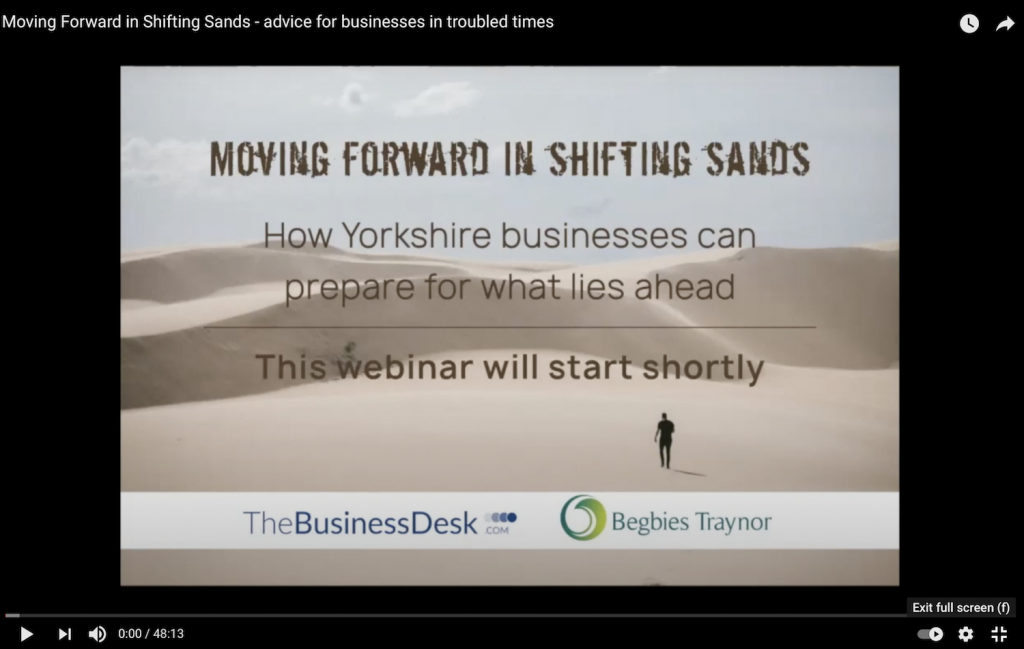Moving Forward in Shifting Sands – advice for businesses in troubled times

Webinar speakers hammered home the importance of companies getting a firm grip on their finances, working out how to restructure where necessary and maintaining a dialogue with creditors and landlords.
A panel of experts offered their views at the “Moving Forward in Shifting Sands” event, organised by TheBusinessDesk.com in partnership with Begbies Traynor.
It was staged to help Yorkshire firms understand how they can begin recovering in 2021 from the unprecedented turmoil inflicted by the pandemic.
The panel featured Joanne Hammond, director at Begbies Traynor, Karl Hodson, partner at BTG Advisory, Dave Broadbent, partner at Begbies Traynor, Andrew Mackenzie, partner at Begbies Traynor and Julian Pitts, regional managing partner at Begbies Traynor.
The webinar was chaired by TheBusinessDesk.com’s Yorkshire editor, Ben Ormsby.
He began by asking panellists for their opinions on the toughest challenges facing businesses right now.
Pitts said uncertainty is a major factor, making it extremely difficult for companies to plan.
Mackenzie agreed, noting firms were afraid to take decisions which might jeopardise potential future Government assistance.
Broadbent responded: “Essentially the rule book has gone out of the window. Any historic results you would normally be able to rely on are just non existent.
“People are having to go back to the drawing board to work out if their businesses are effective, whether they set up their business three years ago or 30 years ago. Everybody’s in the same boat.”
Panellists said it is essential company owners keep up a dialogue with other key parties as they chart a course through the crisis.
Mackenzie said: “Talk to your customers and your suppliers. Talk to your bank, to HMRC and your landlord. Keep them all in the loop, because nobody knows when tiers are going to be lifted or how quickly the vaccine may bring us back to a sense of normality.
“You should always have a cash flow forecast – it can be a daily or weekly forecast.”
Pitts added: “It’s surprising how amenable and accommodating people can be if there is communication with them. The worst thing is where people ignore the issue, and don’t have any discussion.
“If they do engage with a supplier who they owe money to they should always pick up the phone to HMRC and have a discussion about deferring a payment. It’s surprising how positive the reaction can be.”
Both Pitts and Hammond outlined the more “drastic” options available for businesses facing serious problems.
Commenting on liquidation, Pitts said a company owner who takes this route is not necessarily going to be out of business for ever.
He explained: “Many who’ve taken that decision will then say ‘I’ll give it another go. I’ll start up again, though maybe I’ll be unincorporated until I’ve fully got myself set up.’
“There is nothing under UK legislation preventing somebody forming another limited company to trade again. Clearly, if there are assets of the old company they want to use, they would have to purchase those from the liquidator.
“What we also see is use of administration. The majority of administrations will lead either to a CVA or a sale of the business.
“A number of business sales are done through the pre-pack procedure, which is a means to try and ensure the continuity of the business to provide the best outcome for creditors, and to manage as seamless as possible a transition from old company to new company.”
Hammond said a CVA is a formal process, enabling a compromise between a company and its creditors.
“It provides for a structure to repay a portion of debt, over a defined period of time,” she said.
“It’s a really valuable restructuring tool where there’s an underlying viable business, and it’s just suffering from a short-term issue, and where the directors want to trade out their difficulties.
“We’ve all seen CVAs used widely over the last few years, in relation to the retail, leisure and hospitality sectors where it’s been used as a mechanism to deal with, particularly, landlord pressure.
“But more recently, we’re starting to see them used by businesses struggling in the short-term due to the pandemic.”

Julian Pitts
The panel offered tips on how firms should manage their finances during this difficult time.
Broadbent said it does not take much to push businesses over the edge, adding the possibility of losing a key customer or supplier means bosses must have a plan B and even a plan C in their back pockets.
Hodson said now is a good time for business to review their credit management techniques.
He said there are simple processes that can be put in place to enhance cash flow and reduce the issue of late payments.
Hodson advised: “Businesses need to react to changes in working practices, as some customers may still be working remotely, and adapting to new processes within their own businesses.
“It’s a good idea to have regular contact with customers to understand what changes they’ve made to make sure the invoice has reached the right person.

Andrew Mackenzie
“At the beginning of the COVID-19 restrictions many businesses were understandably more lenient towards customers who were having payment problems, which clearly isn’t sustainable in the long term.
“So it’s important to have a robust strategy to deal with customers.
“This means understanding their current circumstances. So, again, picking up the phone to them is vital.
“It’s important to regularly carry out credit checks on customers, as information on their current financial status may require changes to existing credit terms.
“It’s also worth businesses reviewing how they invoice and how they accept payments. Sending invoices by email may be more effective than using the postal system. And looking into electronic payment methods, such as payment by card, will allow the customers to pay quickly and safely.
“Obviously, some debts may remain difficult to collect and the longer those debts go unpaid, the harder it becomes to collect them.

Karl Hodson
“With overdue debts, it’s important to engage professional support as early as possible, allowing the credit control team to keep up to date with those invoices that are becoming due, rather than focusing on chasing older debt.”
Webinar panellists were asked when current flexibility over payments is likely to come to an end.
Pitts acknowledged there is pressure on the Government to ensure tax collections ramp up again. But he stressed there is also political pressure on HMRC to avoid forcing companies into formal insolvency.
He said: “Landlords are faced with a real dilemma. If they seek to force the issue and wind up a tenant for non payment of rent the reality is, in certain sectors, they are going to be left with an empty property.
“They will have the challenges of finding a new tenant, costs of maintenance of that empty property, empty rates liability etc.”

Joanne Hammond
Panel members struck a cautiously optimistic note in relation to 2021, pointing out that some sectors should benefit relatively quickly once lockdown restrictions begin easing.
Hammond said the manufacturing sector should hopefully be able to exploit pipeline work once conditions start to normalise.
She added: “The sector is generally hopeful that the March budget is going to include Government commitments to make good on promises to invest in infrastructure, defence etc In the UK, with a focus on using British suppliers.
“The other thing that might help the UK is if we can get ahead in the ‘vaccine race’ compared to the Continent. We might have a competitive advantage there.

Dave Broadbent
“But if you watch the news at the moment, the success of the vaccine scheme seems to change on a daily basis.”
Pitts said: “I think there’s real positives in certain sectors. If you look at tourism, there will be ‘staycations’ due to the lack of international travel.
“So for everybody involved in the tourist industry in the UK – those with holiday cottages catering, hospitality and leisure within the UK tourism industry – there should potentially be a big upturn as we move forward into the year.”
If you missed the discussion and would like to watch the full webinar again, you can do so by clicking the image below.











